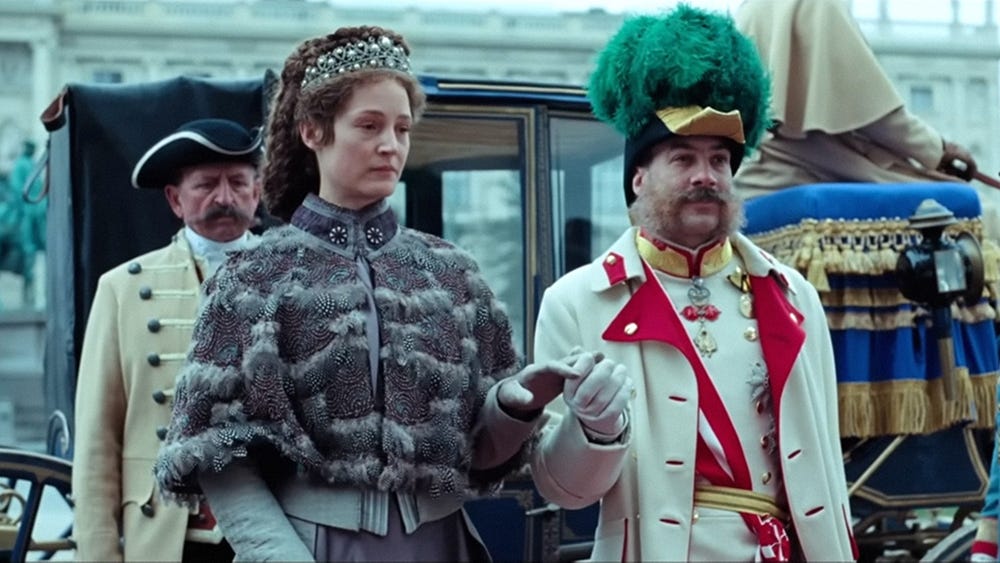Corsage
A curiously flat portrait starring Vicky Krieps as a 19th century monarch rebelling against the strict, staid life laid out for her. We should all be so unlucky.
Am I the only one who’s a teeny bit tired of portraits of rich/royal/powerful figures chafing at the lives of confinement their position locks them into?
Don’t get me wrong; I’m sure 1-percenters suffer a lot more pain and anxiety than we among the great unwashed can imagine. It’s been said — and it’s true — that money can’t buy you happiness.
But my counter to that aphorism has always been, “But it can sure as hell help you avoid a whole lot of misery.” (© Lloyd 2023)
So when I see a picture like “Corsage,” which stars Vicky Krieps as Elisabeth, the real-life 19th century Empress of Austria (and Queen of Hungary to boot), and watch her overcome the lethargy at the lack of purpose in her pampered life, I can’t help thinking how much more interesting almost anyone in her palace would be.
For instance, in this tale written and directed by Marie Kreutzer, there is a tragic sister figure who is forced to dote upon the empress, forbidden to marry and forge her own identity. And a put-upon pair of maids, constantly confused for each other, who must strive to complete even the most ridiculous tasks assigned. And a gay cousin, really Elisabeth’s only true friend, who carefully navigates the prim dictates of gentry society.
Honestly, I’d rather see any of those stories instead of this one.
Krieps, best known on these shores for her role in “The Phantom Thread,” gives a plaintive, effective performance as the empress. Elisabeth was celebrated and gossiped about as the most beautiful woman in Europe, and endured daily hours of hair grooming, veal face masks and other kooky rituals.
Her long hair, carefully braided, is wrapped around her skull like a permanent, second crown she cannot put off.
The movie, which takes a fictional modern spin on the historical record — accented by a smattering of contemporary pop tunes — is essentially two hours of her moping and finding small ways to rebel against her strict, staid life. This mostly consists of sneaking off from her handlers for horse rides, sticking her tongue out at her doctor or other chaste endeavors that rate about a 3 out of 10 on the scale of shocking things.
Her relationship with her husband, Emperor Franz Joseph (Florian Teichtmeister), would seem to hold the most ripe possibilities for intriguing dramaturgy. He’s a conservative, militaristic type more concerned with protecting and expanding his empire than being a good husband. He’s also miffed that his wife prefers to decamp to her more laidback home country of Hungary for months at a time rather than be at his side at court in Vienna.
But the story misplaces him for long periods, so we never get a good bead on what makes him tick. There are stretches where Elisabeth seems to absolutely loathe him, and then she’ll turn around and try to rekindle their passion at their next meeting. It’s a fickle depiction, almost like the fake muttonchops the emperor puts on and takes off for public appearances.
Similarly, the empress’ relationships with her young daughter, Valerie (Rosa Hajjaj), and teenage son, Rudolf (Aaron Friesz), come and go as her attention waxes and wanes. They both feel rather embarrassed by the way their mother treats her high station so haphazardly, smoking (!) and consorting with commonfolk like the patients at the asylums she likes to visit.
There’s a brief hint at a possible romantic temptation with Bay, an English horse trainer played by Colin Morgan. But this is tried on like one of Elisabeth’s many fancy gowns, then discarded when it proves uncomfortable.
I found it interesting how the empress’ appearance was so widely commented upon — even included in the worshipful songs her subjects sing to her — and how she internalizes that feature of her persona. She starves herself, fanning herself at dinners instead of eating the fancy dishes lovingly caressed by the camera, and has her servants strangle her into her corset (corsage in their vernacular), constantly measuring her and weighing her.
That would be a good topic to parallel with modern beauty standards, with all our bleaching and liposuction and body ‘decoration.’ But Kreutzer makes this just another part of the background around Elisabeth.
That’s the overall feel I got from “Corsage.” It’s a movie all dressed up with promising ideas, but it fails to adequately pursue them and paint a vivid portrait of a life of privilege but also great despair. I struggled to feel sympathy for Elisabeth, who comes across in Krieps’ portrayal as more spoiled brat than tortured soul.
I get there’s little sympathy for elites these days. This past year has seen a whole slew of movies depicting them as loathsome, twisted souls — “The Menu,” “Triangle of Sadness,” etc. The truth lives, as it usually does, somewhere in between.





